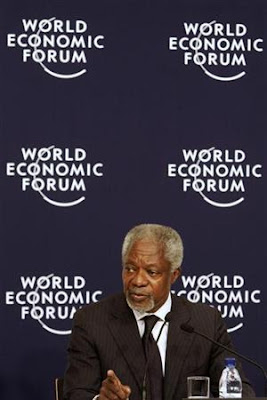Erica Maylee (Junior Majoring in Political Science and International Relations)
December 12 – 21 marks the Tenth Session of the Assembly of States Parties (ASP) – the governing body of the International Criminal Court. As an American undergraduate student at
Central Michigan University, and a member of the
International Criminal Court Student Network (ICCSN), I attended part of the Tenth Session to continue my education on the Court, and witness first-hand another facet of the Court’s work, after several months spent blogging about the ASP on
romestatute.com.
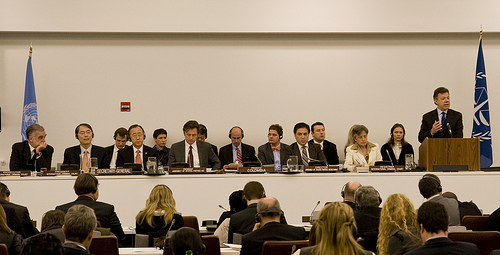
On December 12 I attended the first day of ASP activities – which are being held at the United Nations Headquarters in NYC. This first day was moving because not only was I present at the United Nations – a place I have dreamt about and admired for many years as a young adult – but also because I was in the presence of some of the world’s most creative, brilliant, and powerful individuals. Individuals attending the ASP from NGOs and countries all around the world, are the movers and shakers of our day. Most share a common vision of a better, stronger International Criminal Court that will continue to grow and evolve as 2012 marks its ten-year anniversary. As an American, a citizen of a country not party to the Rome Statute, I really made an effort to listen and take in all the remarks made by speakers from other countries that belong to the Rome Statute system. As a member of the ICCSN, I support the Court and wish the United States would ratify and implement the Rome Statute.
On day one of the Tenth Session the election of the ICC’s next chief prosecutor took place. Current chief prosecutor, Luis Moreno Ocampo, will finish his term in June of 2012, and his newly elected successor will be Fatou Bensouda of the Gambia. Her election by consensus was a beautiful moment to witness, and I was inspired by her strong presence. This election is not only an accomplishment and new chapter for the ICC, but it is also a tremendous step forward for Africa, and for women. In her acceptance speech, Ms. Bensouda mentioned starting her path to international law as an intern at a local court in Gambia. Her start was the same as almost anyone’s -- if you can dream it, you can do it.
Lastly, I feel I should elaborate on the experience of the ASP’s Tenth Session from the perspective of an American student. As I mentioned earlier, the United States is not party to the Rome Statute (for a variety
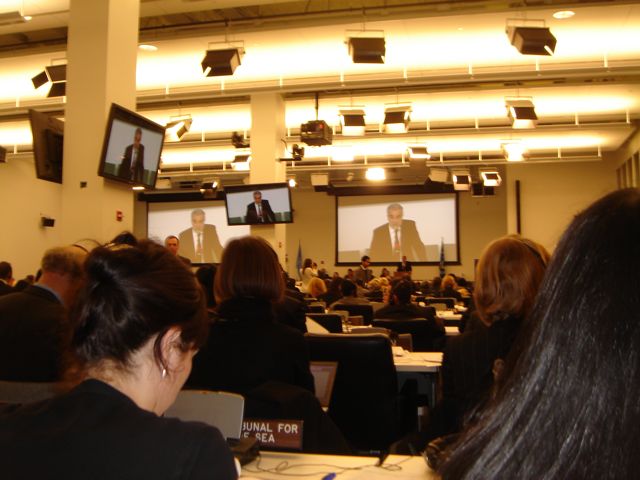
of reasons, including the difficulty in ratifying the document, which requires a 2/3 vote of approval from the Senate), but it is important for the world to know that the U.S. was definitely present at the Tenth Session. A United States’ delegation was there every day I attended – December 12 – 14. The United States also hosted a side event on the ICC and victims’ protection, which was well attended. Also important to note is the fact that several Americans were present at the ASP with NGOs or as individuals. Americans from the
American Coalition for the International Criminal Court (AMICC) and from
IJCentral attended, as well as students from the
ICCSN and American professors. It is important for people to know that even though America is not party to the Rome Statute, there are still concerned and engaged Americans with an interest in the Court and a strong desire to see the United States becoming a member.
Attending the Tenth Session of the ASP was a wonderful opportunity to witness the work of the international community of the ICC and also to network with others who support the Court. There is always substantive information that can be gathered, but for me, the most critical knowledge I received from this experience revolved around the people. It is my belief that through many people’s dreams, hard work, and revolutionary ideas, the ICC will continue to evolve and grow stronger after its first ten years. The Tenth Session of the ASP is just the start of a new chapter for the Court.
_______________________________________
Jeffrey Lambert (Senior Majoring in Philosophy and Political Science)
I am an American, undergraduate student involved in the
ICCSN, and had the privilege to study and engage with the Court and the network surrounding it for the past two semesters, including a study abroad class which focused almost exclusively on the Court. While in the Netherlands, I was able to sit in on Court proceedings, get to know some people who work with the various organs of the Court, and learn a lot about where the Court is and where it needs to go.
Some of the of the more memorable moments of the 10th session of the ASP include witnessing Prosecutor-elect Fatou Bensouda, outgoing prosecutor Luis Moreno-Ocampo, and outgoing ASP President Christian Wenaweser give their historic speeches. So
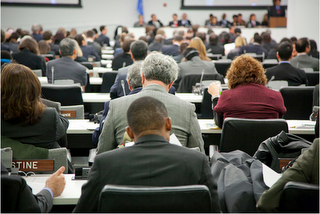
much has happened in the nine years since the Court became operational, and it was unforgettable to witness the “passing of the torch”. Prosecutor Moreno-Ocampo sent a message that recognised how far we need to go to establish rule of law to protect people from violation of their human rights, citing a 20th century death toll of a hundred million people. Fatou Bensouda gave an inspirational acceptance speech that, as a student, was more than educational. She said that she knew her life’s purpose was to be a champion for human rights, and that it all started when she herself was a student interning at a local court in Africa. She was embodying the values of the ICC before the ICC was an actual institution. Prosecutor Moreno-Ocampo’s story is similar – he thought that prosecuting generals in Argentina was his crowning moment and the apex of his career, yet it proved to be training for the larger role as Prosecutor of the ICC. It was almost magical to witness these human rights luminaries talk about their humble beginnings and how they had no idea that what they were doing would turn into their current roles at the ICC.
I was also struck by the way in which was the U.S. delegates interacted with the court. It became clear that although the U.S. is not a member state, it nonetheless has an active role in influencing the Court. One clear example is provided by 'side-event' entitled “Witness Protection: Lessons Learned and Ways Ahead”, which
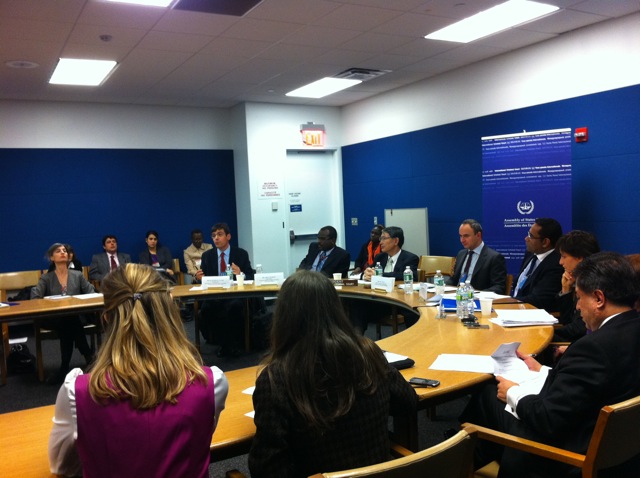
the U.S. co-sponsored with Denmark and Uganda. One of the biggest concerns the Court has right now is how to protect witnesses and victims that testify before the Court in a way that not only protects the witness and their family, but does so in a way that does not infringe upon defence rights. The United States - ably represented by U.S. Ambassador for war Crimes, Stephen Rapp - was able to draw on past experience to help the Court better protect witnesses in the future. Rapp also stressed the importance of ‘relocation agreements’, which enable both member and non-member states to assist the ICC in its protection of witnesses.
To conclude, it was reassuring to witness numerous U.S. citizens speak about how to strengthen the Court. If you are curious to learn more about how Americans feel about the ICC, I encourage you to look at the public opinion polls available on the website of the
American Coalition for the International Criminal Court._______________________________________
Hope May (Professor of Philosophy at Central Michigan University/Attorney at Law, pictured below with Jeffrey Lambert)
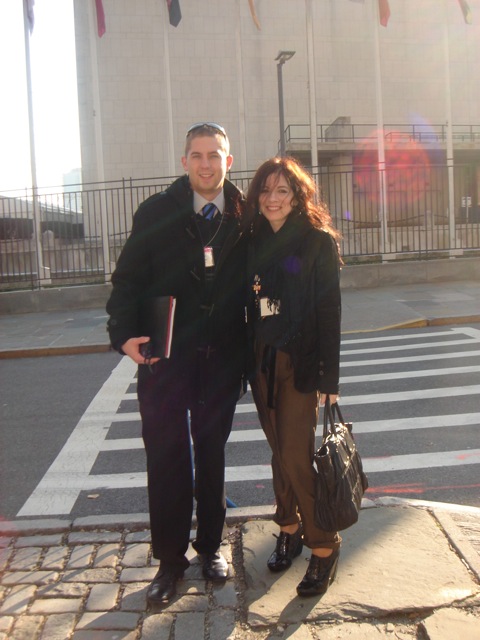
I am attending the 10th session of the ASP as an American philosophy professor and lawyer, deeply committed to educating American undergraduates about the ICC. Because I believe there is too much written, too much said, and much to be done, I mark my participation in this historic session by quoting the eloquent words of three eminent men: Judge Sang-Hyun Song, Aristotle and W.H. Murray. While I heard Judge Song’s words first hand at an ASP side event, the remarks of Aristotle and Murray have come to me repeatedly during this session.
1) The biggest obstacle to universal ratification and implementation of the Rome Statute system is sheer lack of knowledge - specifically regarding the system of complementarity
- ICC President Judge Sang-Hyun Song at the ASP 10th session side-event "Plan of Action: Universalization and implementing legislation, developments and resources".
2) Where there are things to be done the end is not to survey and recognize the various things, but rather to do them
-Aristotle, Nicomachean Ethics
3) The moment that one definitely commits oneself, then Providence moves too
-W.H. Murray
 This week the ICC dismissed its first suspect from charges of war crimes and crimes against humanity. The Pre-Trial judges found the prosecution had provided insignificant evidence to warrant a trial and ordered former Rwandan rebel leader Callixte Mbarushimana's release. Mbarushimana was arrested in France and extradited to the Court this past January. The Prosecutor appealed the decision, which was rejected earlier this week. Mbarushimana's release is currently being delayed due to a U.N. Travel Ban against him. Earlier this week the Office of the Prosecutor said it will review Libyan authorities' investigation of the death of Gaddafi to ensure that a genuine and effective investigation meeting international standards is taking place. The Prosecutor has decided to postpone a decision regarding launching its own investigation into the matter until next year. In other news, last week the ICC referred Kenya, Chad, Malawi and Djibouti to the UN Security Council for failing to arrest President Bashir of Sudan while visiting the states' territories.
This week the ICC dismissed its first suspect from charges of war crimes and crimes against humanity. The Pre-Trial judges found the prosecution had provided insignificant evidence to warrant a trial and ordered former Rwandan rebel leader Callixte Mbarushimana's release. Mbarushimana was arrested in France and extradited to the Court this past January. The Prosecutor appealed the decision, which was rejected earlier this week. Mbarushimana's release is currently being delayed due to a U.N. Travel Ban against him. Earlier this week the Office of the Prosecutor said it will review Libyan authorities' investigation of the death of Gaddafi to ensure that a genuine and effective investigation meeting international standards is taking place. The Prosecutor has decided to postpone a decision regarding launching its own investigation into the matter until next year. In other news, last week the ICC referred Kenya, Chad, Malawi and Djibouti to the UN Security Council for failing to arrest President Bashir of Sudan while visiting the states' territories. 

 of reasons, including the difficulty in ratifying the document, which requires a 2/3 vote of approval from the Senate), but it is important for the world to know that the U.S. was definitely present at the Tenth Session. A United States’ delegation was there every day I attended – December 12 – 14. The United States also hosted a side event on the ICC and victims’ protection, which was well attended. Also important to note is the fact that several Americans were present at the ASP with NGOs or as individuals. Americans from the
of reasons, including the difficulty in ratifying the document, which requires a 2/3 vote of approval from the Senate), but it is important for the world to know that the U.S. was definitely present at the Tenth Session. A United States’ delegation was there every day I attended – December 12 – 14. The United States also hosted a side event on the ICC and victims’ protection, which was well attended. Also important to note is the fact that several Americans were present at the ASP with NGOs or as individuals. Americans from the  much has happened in the nine years since the Court became operational, and it was unforgettable to witness the “passing of the torch”. Prosecutor Moreno-Ocampo sent a message that recognised how far we need to go to establish rule of law to protect people from violation of their human rights, citing a 20th century death toll of a hundred million people. Fatou Bensouda gave an inspirational acceptance speech that, as a student, was more than educational. She said that she knew her life’s purpose was to be a champion for human rights, and that it all started when she herself was a student interning at a local court in Africa. She was embodying the values of the ICC before the ICC was an actual institution. Prosecutor Moreno-Ocampo’s story is similar – he thought that prosecuting generals in Argentina was his crowning moment and the apex of his career, yet it proved to be training for the larger role as Prosecutor of the ICC. It was almost magical to witness these human rights luminaries talk about their humble beginnings and how they had no idea that what they were doing would turn into their current roles at the ICC.
much has happened in the nine years since the Court became operational, and it was unforgettable to witness the “passing of the torch”. Prosecutor Moreno-Ocampo sent a message that recognised how far we need to go to establish rule of law to protect people from violation of their human rights, citing a 20th century death toll of a hundred million people. Fatou Bensouda gave an inspirational acceptance speech that, as a student, was more than educational. She said that she knew her life’s purpose was to be a champion for human rights, and that it all started when she herself was a student interning at a local court in Africa. She was embodying the values of the ICC before the ICC was an actual institution. Prosecutor Moreno-Ocampo’s story is similar – he thought that prosecuting generals in Argentina was his crowning moment and the apex of his career, yet it proved to be training for the larger role as Prosecutor of the ICC. It was almost magical to witness these human rights luminaries talk about their humble beginnings and how they had no idea that what they were doing would turn into their current roles at the ICC.  the U.S. co-sponsored with Denmark and Uganda. One of the biggest concerns the Court has right now is how to protect witnesses and victims that testify before the Court in a way that not only protects the witness and their family, but does so in a way that does not infringe upon defence rights. The United States - ably represented by U.S. Ambassador for war Crimes, Stephen Rapp - was able to draw on past experience to help the Court better protect witnesses in the future. Rapp also stressed the importance of ‘relocation agreements’, which enable both member and non-member states to assist the ICC in its protection of witnesses.
the U.S. co-sponsored with Denmark and Uganda. One of the biggest concerns the Court has right now is how to protect witnesses and victims that testify before the Court in a way that not only protects the witness and their family, but does so in a way that does not infringe upon defence rights. The United States - ably represented by U.S. Ambassador for war Crimes, Stephen Rapp - was able to draw on past experience to help the Court better protect witnesses in the future. Rapp also stressed the importance of ‘relocation agreements’, which enable both member and non-member states to assist the ICC in its protection of witnesses. I am attending the 10th session of the ASP as an American philosophy professor and lawyer, deeply committed to educating American undergraduates about the ICC. Because I believe there is too much written, too much said, and much to be done, I mark my participation in this historic session by quoting the eloquent words of three eminent men: Judge Sang-Hyun Song, Aristotle and W.H. Murray. While I heard Judge Song’s words first hand at an ASP side event, the remarks of Aristotle and Murray have come to me repeatedly during this session.
I am attending the 10th session of the ASP as an American philosophy professor and lawyer, deeply committed to educating American undergraduates about the ICC. Because I believe there is too much written, too much said, and much to be done, I mark my participation in this historic session by quoting the eloquent words of three eminent men: Judge Sang-Hyun Song, Aristotle and W.H. Murray. While I heard Judge Song’s words first hand at an ASP side event, the remarks of Aristotle and Murray have come to me repeatedly during this session.


